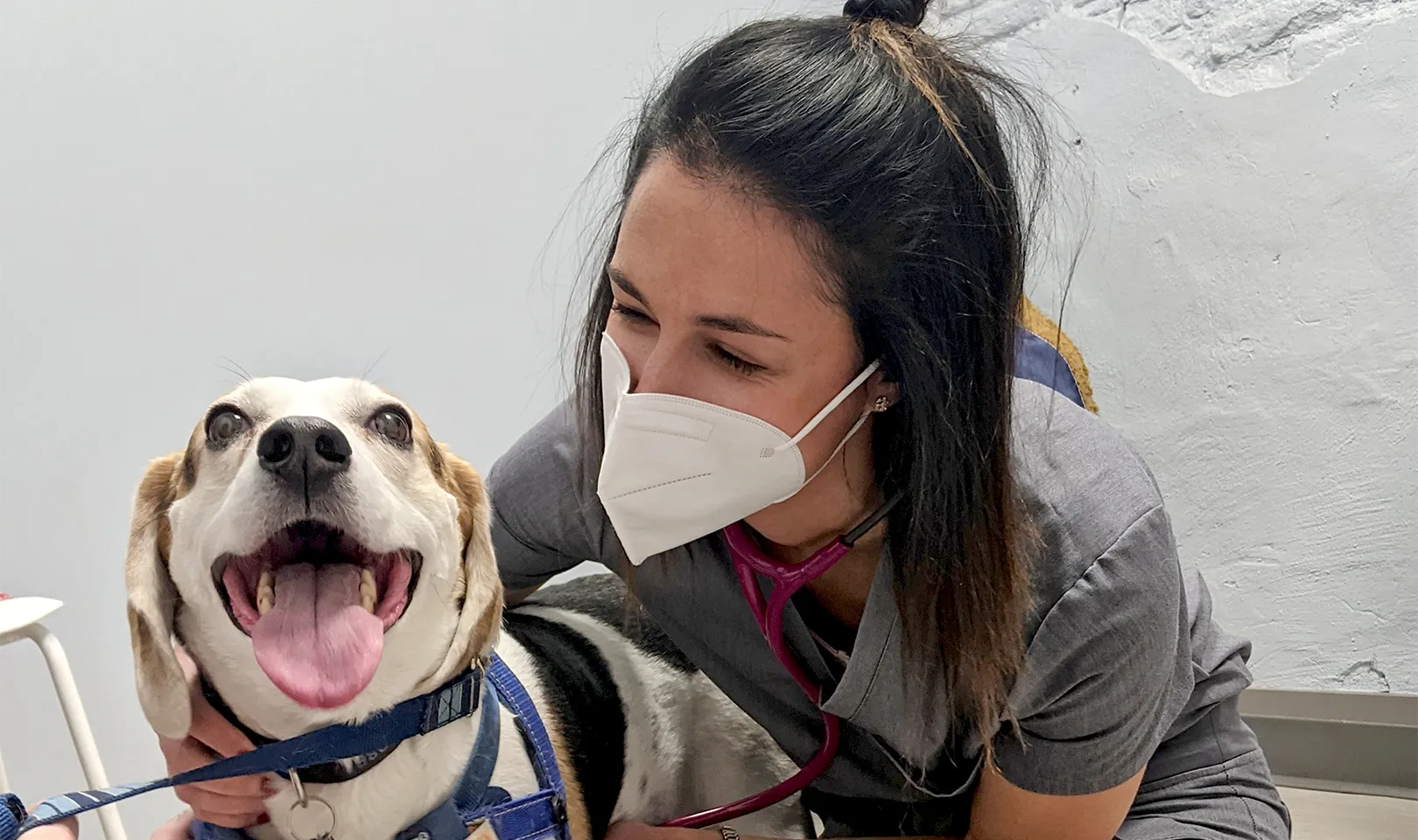Heartworm disease: How can my dog be infected?


As a small animal veterinarian in New Jersey, I commonly ask my clients if their pet is currently on heartworm prevention. Many owners tell me their dog does not need heartworm prevention because they “barely go outside” or “just aren’t at risk.” Unfortunately, many owners do not know what heartworm disease is and how easily their pet can become affected, right in their own backyard.
In this article, we will discuss what heartworm disease is and the common myths and misconceptions that surround this potentially fatal disease.
What is heartworm disease?
Heartworm disease is caused by the parasitic worm Dirofilaria immitis. This parasitic worm is spread by one of the most common insects we have across the United States – the mosquito. Just like humans, our canine companions can easily be bitten by mosquitoes swarming around their backyard while out for a quick walk or during a bathroom break. It only takes one bite from an infected mosquito for your dog to become exposed to the parasite that causes heartworm disease. Therefore, it is so important to discuss heartworm prevention with your local veterinarian to prevent this parasitic worm from maturing inside your beloved pet and leading to a potentially fatal disease process (heartworm disease).
Humans can also be exposed to this parasitic worm. However, because we are not the proper host for this parasite to survive in, unlike our canine companions, we thankfully do not have the same risk factors for developing clinical heartworm disease.
How can heartworm disease affect my dog?
One of the most common misconceptions about heartworm disease is that your dog must live in a particular area to become affected or exposed. In reality, heartworm disease can affect any dog in the United States. Yes, many states have higher levels of exposure to heartworm disease than others, primarily because of the vector that transmits this deadly parasite – the mosquito. Southern states where the temperature stays above freezing for most of the year will have more mosquito exposure than a state in which it snows routinely throughout the winter. The temperature itself does not eliminate the risk of heartworm disease completely. Many of the species of mosquitos that can transmit the parasite that causes heartworm disease can survive in temperatures well below 70 degrees.
Once your dog is infected by the parasite that causes heartworm disease (Dirofilaria immitis), it will slowly mature and grow inside your pet until it reaches adulthood unless your dog is on medication to prevent this process called heartworm prevention. Heartworm prevention works by killing off this parasitic worm before it can mature into a full-sized adult worm that can become up to 12 inches in size and cause life-threatening heart and lung damage! This life cycle is important to remember because once these parasitic worms mature into adults inside your pet, they can produce offspring (microfilariae), which can cause further damage to your pet. This entire process takes months, and your dog may not exhibit any obvious clinical signs of infection (coughing, exercise intolerance, weight loss) until it is too late.
This is also why having your pet routinely examined by your veterinarian and annually tested for heartworm disease is extremely important. Many dogs have a significant amount of disease already present once they test positive for heartworm disease. Knowing that missing just one dose of heartworm prevention can allow your dog to become infected is critical.
Want more clinical & industry news from IndeVets? Sign up here.
How can I protect my pet from heartworm disease?
The best way to protect your pet from heartworm disease is to schedule an appointment with your veterinarian and determine which heartworm option is best for your pet. Many different forms of heartworm prevention are available right now, including monthly oral and topical options. There is even an injectable heartworm option that can be administered to your dog by your local veterinarian, which may be an excellent option for those furry friends who hate taking oral medication.
Heartworm prevention is also very affordable, especially when compared to the cost of treatment for heartworm disease. Many of the monthly heartworm preventions, on average, range from about $8 to $20 a month, whereas the treatment for heartworm disease itself can cost thousands of dollars and even the need for lifelong treatment in your pet. This also does not consider the emotional toll that comes from having a dog that tests positive for heartworm disease. When your dog goes through treatment for heartworm disease, it must be confined to a crate or small area for months, sometimes almost an entire year, to prevent lung and heart damage while the parasitic worms are dying off. The injections that are used to kill the adult parasitic worms that cause heartworm disease are painful, and the treatment process for heartworm disease itself is a very long and labor-intensive process. Without treatment, though, many heartworm-positive dogs will die from secondary complications such as heart failure, lung disease, and even potentially kidney failure.
In summary
Heartworm disease is very preventable. It is crucial to keep your canine companion on heartworm prevention year-round to prevent exposure to this dangerous parasite. If you want to read more about heartworm disease and how it can affect your pet, please consider looking at the American Heartworm Society’s website, as it is full of many great resources for pet owners.
Dr. Courtney Zinna is an Associate IndeVet practicing in South Carolina.
More from IndeVets:
I found a tick on my dog, now what?
5 tips for happily coexisting cats and houseplants
